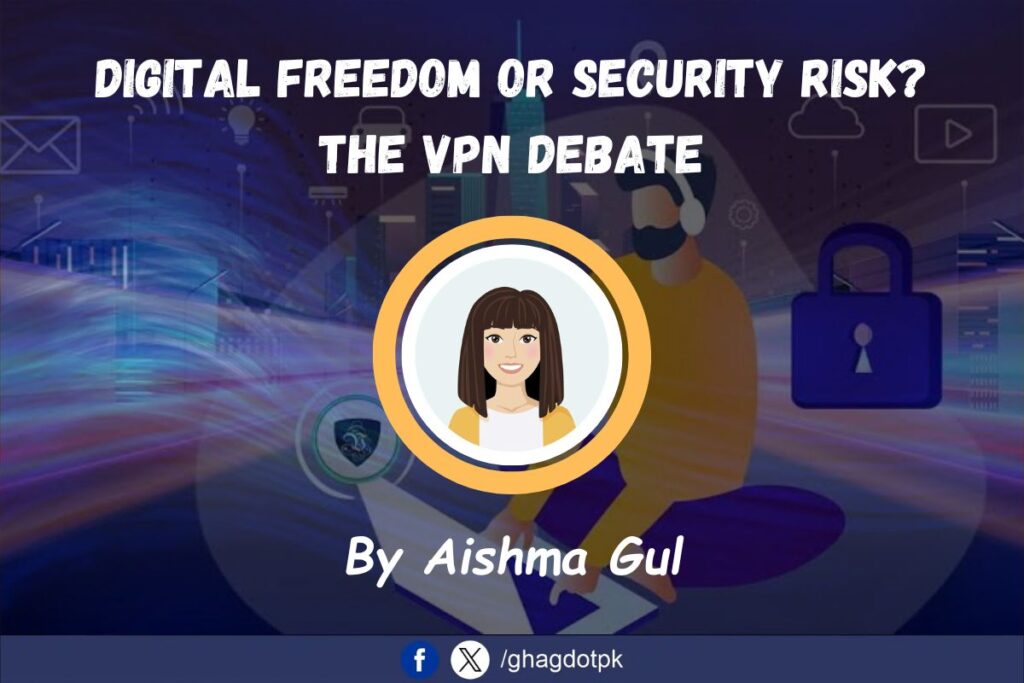By Aishma Gul
What happens when tools for digital freedom collide with national security concerns? Pakistan’s VPN landscape contains some answers. Virtual Private Networks (VPNs), which are meant to preserve privacy, have also been exploited for malicious reasons. The Ministry of Interior has requested that the Pakistan Telecommunications Authority (PTA) remove illicit VPNs, citing concerns about terrorists using them to assist violent acts and financial transactions. This development highlights the persistent struggle between protecting internet freedoms and combating major security threats.
VPN Regulation in Pakistan
As Pakistan attempts to grow its digital economy, the role of VPNs has come under scrutiny. The Pakistan Telecommunication Authority (PTA) recently granted a two-week delay for VPN registration, with enforcement against unregistered VPNs set to commence on December 1, 2024. The decision has triggered a larger debate about the balance of national security and individual privacy in the digital age.
PTA’s Stance on VPN Usage
The PTA’s decision to extend the deadline demonstrates its dedication to improved cybersecurity. Citing VPN abuse as a serious security danger, the government has made VPN registration mandatory to guarantee safe and controlled internet access. According to PTA Chairman Hafeez-ur-Rehman, VPNs are not strictly prohibited in Pakistan, highlighting their significance for freelancers, multinational companies, and other authorized users who depend on them for safe data transmission.
“VPNs remain operational in Pakistan and are essential for freelancers, companies, and everyday users alike,” Rehman affirmed. This statement clarifies that the PTA’s efforts are not intended to outlaw VPNs, but rather to require registration to monitor and mitigate any security issues.
The Security Need: Protecting Data
VPNs create private, encrypted connections that enable users to avoid geo-restrictions and protect sensitive data. Diplomats, government officials, and businesses in Pakistan utilize them extensively to protect data and communications. The technology’s capacity to mask IP addresses and encrypt data transfer is critical for reducing the risks connected with digital spying and hacking.
Terrorists in Pakistan are increasingly using VPNs, raising concerns about national security. Criminal networks, especially terrorist groups, use VPN technology to hide their internet activity, making it more difficult for authorities to track communications and transactions. This anonymity is frequently used to organize attacks, manage logistics, and even ease the transfer of finances for illegal operations. To prevent these risks, authorities want advanced surveillance systems that can trace the flow of data while respecting ordinary citizens’ rights.
VPNs also give users unmonitored access to restricted websites and services. On a recent Sunday, the PTA stated that over 20 million Pakistanis attempted to use VPNs to access restricted content, raising concerns about the use of VPNs in bypassing internet regulations.
Moral Concerns: Islamic Ideology Council’s View
The Islamic Ideology Council has joined the discussion, expressing concern about VPNs being used for purposes that may violate Islamic values. While the Council recognizes that VPN technology is not intrinsically illegal, it has drawn parallels between VPN abuse and other acts of public indecency. The Council’s Chairman, Allama Raghib Naeemi, compared unregulated VPN usage to “abuse of the loudspeaker,” calling for government oversight to protect moral and social norms.
This viewpoint is consistent with that of other regulatory bodies, which argue that while VPNs have many beneficial uses, their unrestricted usage can encourage behaviors that violate Pakistan’s societal values. “Just as we regulate other forms of public behavior for the collective good, VPNs require a controlled framework to prevent misuse,” Naeemi said in a recent statement.
Economic Impact: VPNs for Freelancers and Businesses
Pakistan’s digital economy is growing rapidly, with freelancers and remote workers playing significant roles. Pakistan currently has over a million freelancers contributing to the economy, and this figure is only expected to grow. VPNs are critical to this industry, allowing for safe communication with overseas clients and access to global platforms. These freelancers generate millions of dollars in revenue, demonstrating VPNs’ important role in supporting Pakistan’s digital workforce.
In contrast, countries such as India and Bangladesh make significant economic gains from remote employment, with India making billions of dollars through its freelance workforce. Pakistan’s IT sector has the potential to equal these figures, assuming regulatory measures do not hinder the expansion of digital freelancing. Hafeez-ur-Rehman emphasized this idea, stating, “The IT industry cannot function without VPNs.”
Balancing Surveillance and Freedom
The regulation of VPNs in Pakistan is a delicate balance between national security and individual freedoms. While the Pakistan Telecommunications Authority (PTA) has taken steps to address security issues by enforcing VPN registration, this decision has attracted widespread criticism. Critics worry that such restrictions could stifle internet freedom, which is critical in an era when VPNs provide an important barrier to privacy in a highly connected world.
Periodic internet outages, which the government used as a tool to control social unrest, have made matters more difficult. The economy has already suffered as a result of these disruptions. Stricter regulations on VPN use may widen the gap between the government and the younger, tech-savvy population, many of whom depend on unrestricted internet access for education, working remotely, and maintaining global connections.
Balancing VPN Use and Freedom
To address security and privacy concerns, a balanced regulatory approach is required. Experts recommend a multi-layered VPN strategy that encourages legitimate use while penalizing unauthorized operations. This method will allow Pakistan to profit from VPN technology while protecting its national interests. Additional funding for education and awareness campaigns regarding ethical VPN use could also help to match public perception with national security objectives.
Navigating Pakistan’s Digital Future
As Pakistan embarks on its journey toward a “Digital Pakistan,” the VPN debate serves as a critical touchstone. The path forward must balance security with freedom, fostering a safe digital environment while enabling economic growth. With carefully crafted policies, Pakistan can safeguard its digital infrastructure, protect its citizens’ data, and support its thriving IT sector. The PTA’s current stance on VPN registration represents the first step in a long journey to create a secure yet open digital landscape, one that balances national security with the needs of a growing digital economy.






